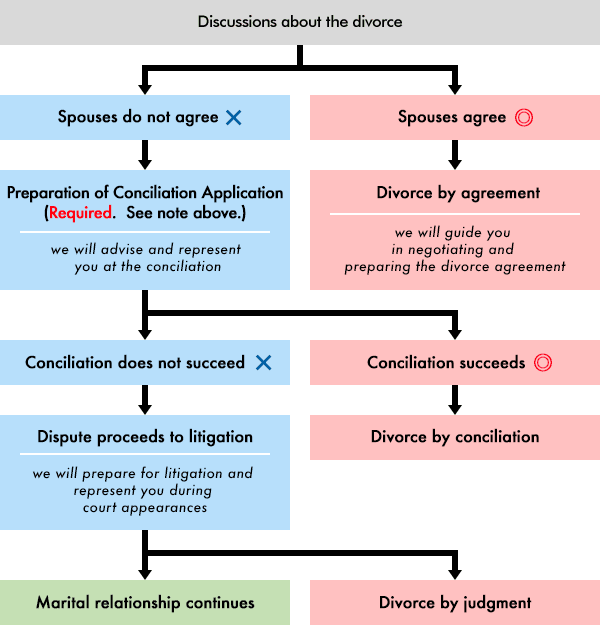The sequence of events for a divorce
Please note, that prior to seeking a divorce by judgment, Japanese law requires that the parties first conduct conciliation.
For more details, please see our Divorce by Conciliation page.

Divorces in Japan are Mostly Non-Judicial
Unlike many countries in the world, divorces in Japan are mostly non-judicial (meaning that most divorces do not get the court involved).
The following are the various ways to get a divorce in Japan.
Divorce by agreement (協議離婚, kyogi rikon)
Divorces (known as 離婚 or “rikon” in Japanese) that occur outside of court and based upon discussions between the husband and wife are called “divorce by agreement” (known as 協議離婚 or “kyogi rikon”) .
The vast majority of divorces in Japan are divorces by agreement, which never get the courts involved.
Because the parties frequently become emotional during discussions, it may be difficult to agree to get a divorce.
In such cases, it may be advisable to hire an attorney to represent you in discussions.
Additionally, we recommend that you hire an experienced attorney because there are many issues that must be decided upon when getting a divorce such as (a) parental authority (known as 親権 or “shinken”) over the children, (b) conditions for meeting with the children, (c) the amount of and who will be paying child support (養育費 or “yoikuhi”), and (d) compensation for emotional damages (慰謝料 or “isharyo”) and terms of the division of assets.
In certain cases, in order to avoid future trouble, it may be advisable to notarize the divorce agreement which contains all of the matters agreed upon through discussions by the parties.
Divorce by conciliation (調停離婚, chotei rikon)
Where the husband and wife cannot agree through discussions, the husband and wife use a family court procedure called conciliation (調停離婚 or “chotei rikon”).
In Japan, conciliation is required by law prior to seeking a divorce by judgment.
A party may decide to have an attorney apply for conciliation on their behalf.
Conciliation is similar to a mediation in certain countries, whereby the parties are provided a place to conduct discussions.
The conciliation is mediated by one judge and by a two-person conciliation committee which consists of one male and one female conciliator.
When the divorce and its terms are decided at the conciliation, the court prepares a written record detailing what was agreed to by the parties.
The written record has the same effect as a court judgment, and if a party fails to obey the written record, the other party may force the disobeying party to obey it.
However, because there are certain terms that a party cannot force the disobeying party to obey, it is advisable to seek the advice of an attorney even where conciliation is being utilized.
Divorce by judgment (裁判離婚 or “saiban rikon”)
If the husband and wife fail to agree to the divorce through conciliation and if discussions are terminated, the family court may decide to issue a decision for divorce (審判離婚 or “shinpan rikon”).
If a decision is issued, and, if the parties fail to object to the decision within 2 weeks, the divorce becomes final.
As a side note, the "decision" procedure is very rarely used.
The court issues a decision only in very rare instances, such as when the parties agree to the divorce itself but cannot agree on minor financial details.
The court may decide to issue the decision because it determines that it will not be economical for the parties and will be a waste of court resources for the parties to fight over minor financial details through litigation.
However, as explained above, even if the court issues a decision, the parties may object to the decision, which will nullify the decision.
If (i) a party objects to the decision or (ii) conciliation fails and the court does not issue a decision, then, either party may file a divorce lawsuit seeking a court judgment for divorce if there is legal grounds to seek such a judgment.
The five legal grounds are, in short, (i) an act of unchastity, (ii) bad faith abandonment, (iii) life or death unclear, (iv) severe mental illness with no prospect of recovery, and (v) other serious reasons that make it difficult to continue the marriage.
A divorce that becomes final based upon litigation is called a "divorce by judgment" (裁判離婚 or “saiban rikon”).
